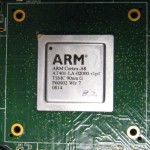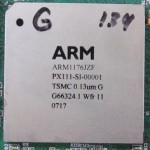March 12th, 2009 ~ by admin
ARM is solely an intellectual Property company. They design, and then license production of their ARM cores to other companies. However when they create a new core, they DO have it produced, in silicon for testing, and for use in toolchain makers to develop compilers etc for.

ARM Cortex-A8
Here are 2 such devices, one the ARM Cortex-A8, which in its fastest version (1100MHz+) can handily beat an Intel Atom in netbooks. The Cortex-A8 is used in the just release Palm Pre.

ARM1176
The ARM1176JZF is used in such devices as the iPhone. Both of these were fabbed by TSMC.
Thanks to Mr. Boys of ARM for the photos.
February 23rd, 2009 ~ by admin
ARM today announced their new embedded microcontroller core. The next in the Cortex line. The M0 implements the standard ARM7 instruction set architecture, but manages to do so in only 12,000 gates. They did so by sacrificing performance for a smaller foot print and power savings. This certainly isn’t the first RISC CPU with such a small foot print. The XAP-RISC processor also manages to do so in 12,000 or so gates.
12,000 gates translates into around 50,000 transistors, which is about the footprint of the Intel 80186 processor. In today’s world of multi-million transistor ASIC’s you’ll see this ARM core everywhere (likely you wont even know its there) . To drop in a 12,000 gate block into a modern ASIC design is nothing, and the benefits can be amazing giving the 32 bit code base available for the ARM.
Source: EE Times
February 11th, 2009 ~ by admin
Today two of the leading chip design companies for mobiles phones, media players, and other ‘connected’ devices merged. SiRF, widely known for their advanced low power GPS receivers and CSR, makers of some of the most widely used Bluetooth devices in the world.
CSR’s BlueCore line of chips integrate a XA-RISC controller, while SiRF’s latest offerings use an ARM7 core. The merger will allow them to build a single chip solution with wifi, bluetooth, and GPS, a device that is likely to find itself in about every connected device you can imagine. It will be interesting to see which processing core they stick with, though it is likely the final products will end up with both.
Source: SiRF Press Release
February 6th, 2009 ~ by admin
NEC has just announced one of the smalled ARM processors you will see. As mobile phones are getting more and more complex, more and better features are being added. In a smart phone such as the Blackberry Storm, or the iPhone, it is not uncommon to have 3 or 4 (or more) ARM cores in the design. NEC just added another. The new NEC CE143 is meant for one thing, running the camera on your phone. Most phone cameras have a 2 or so megapixel cam on them, some are heading towards 8+. The CE143 is meant for 12 megapixel cameras, and can record full 1080p HD video, on your phone. Check out the size of this:

NEC CE143 ARM mobile image processor
Tiny is right and that package includes 64MB of RAM and a MB of Flash
January 21st, 2009 ~ by admin
Marvell, well known for its networking chips, also makes many storage controller solutions and other SoC’s. Marvell currently has two ARM cored lines, the Xscale series (purchased from Intel a year ago) and the Feroceon, a customized ARM core developed by Marvell (they actually have a complete ARM architecture liscense which gives them the ability to design ARM cores beyond the premade IP blocks)
This 88F5182 is a 400MHz processor that I found in a Lacie NAS drive. It has 64K of L1 cache and supports 200MHz DDR2 RAM (64MB of which was included in this Lacie drive)

Marvell 88F5182-A2-C400
Really a pretty impressive device for a networked storage device.
January 20th, 2009 ~ by admin
LSI developped their Fuision-MPT line of SCSI controller (U320 and fibre channel) back in 2001. Well before ‘dual core cpus’ hit mainstream. Continuing from the last post, and found on the same PowerEdge motherboard is an LSI53C1030 Fusion-MPT SCSI controller. This one was made in 2004, and has not one, nor two, but THREE ARM966E-S 32bit cores on it.

Fusion-MPT ARM9 Tri-core by LSI
No idea of the clock speed of the cores, but at 0.18u the cores are good for 200MHz and 250MHz at 0.13u. The chips system clock is sourced by an 80MHz
January 16th, 2009 ~ by admin
Today while browsing the teardown section on Embedded.com I came across an article about a Kodak picture frame. At its heart was a processor by a company called Amlogic. They make among other things, processors for digital picture frames. Their website doesnt have much more info about their products. It appears many of their devices are based on a variety of ARM cores (as often is the case.

If anyone knows anything more about this company, or its interesting processors, let us know
January 15th, 2009 ~ by admin
Today I found my bosses old Dell All-In-One printer, kicked to the curb for operation that cannot be considered flawless. Yanked it apart wand what did we find? Alas a chip by Oasis (no sorry not the band) but Oasis Semiconductor, ironically with their URL marked on the chip:

OA-982 DigiColor2
Oasis? Never heard of them, so I did some research. Oasis was on the forefront of supplying IC’s for the then (late 1990’s) emerging market of All-in-One printers. The DigiColor2 has an ARM core, and a MCS-51 MCU at its heart, integrating nearly all of the functions to run a printer, scanner, copier and fax.
This turned out to be a great business, so much so that SigmaTel decided to buy them out for $57 million in 2005. SigmaTel of course famouse for being the main IC supplier for Apple iPods for many years (until the latest generation) SigmaTel itself has now been bought out by Freescale.
January 13th, 2009 ~ by admin
Intel…err Marvel, who bought the Xscale line FROM Intel has just released the latest in the Xscale line up. The PXA168 wich is an ARM9 core with all the toppings (Ethernet, flash interface, USB etc). Built on a 55nm process it achieves speeds of up to 1GHz while pulling merely 1Watt of power.
Whats it for? “Web connected digital photo frames” says Marvell
Thats an incredible amount of CPU for a picture frame but it is the direction things are going. CPU’s like this are making coding much faster and easier, your embedded code can be very bloated, and inefficient, which equals faster development cycles and quicker profits.
Source: EEProductCenter.com








